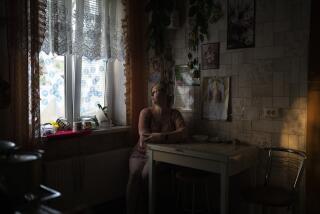Kosovo Refugees Left in Cold at Bosnia Shelter
- Share via
HADZICI, Bosnia-Herzegovina — Just a few steps from Subja Gashi’s bed, chopped bits of a freight pallet are burning in a small stove, and none of the warmth touches her.
It drifts up and away, through the cracks in the ruined Coca-Cola factory’s roof, high above the bed where Gashi spends each day and night under a tent of synthetic, gray blankets.
Her 18-month-old daughter, Pramvera, has been running a high fever for a week now, and when Gashi can lull the child to sleep, the toddler’s mother joins the circle of refugees sitting on Coke crates around the stove. She never stays for more than 20 minutes.
“Even when I sit by the stove, only my front is warm. My back is always cold,” Gashi said as she lay beside Pramvera and tried to soothe her hacking cough. “I spend almost all my time in bed with the children.”
The family is among about 1,000 refugees from the Serbian province of Kosovo who ended up stranded in the Coke factory on Sarajevo’s outskirts last summer after fleeing to the relative comfort of Bosnia-Herzegovina.
The ethnic Albanian refugees were supposed to be evicted in early October and moved to some place with heat and running water. The Coke plant’s local owners wanted to get it working again as Bosnia rebuilds from the ruins of a war that ended in 1995.
Under pressure from the United Nations High Commissioner for Refugees, Bosnia’s government agreed to build a proper dormitory where the Kosovo Albanians could live, at least until their war was over too.
However, the dormitory still isn’t finished. And, in a country with about 30,000 foreign troops who are trained to build fast in the worst conditions, there is no rush to make a warm home for the Coke plant refugees.
Dr. Aziz Kurtovic, a Bosnian physician who treats several cases of bronchitis, fever, diarrhea and skin diseases each day at the factory camp, said he has been told to plan on working there for another month or two.
“It’s like an orchestra of coughing in here at night,” said Zuberi Kujtesa, who lives with her three children in a blanket-tent a few beds down the row from Gashi’s. “No one can sleep. All through the night we hear coughing--and crying.”
Bosnia is supposed to be learning how to stand on its own, and the U.N. refugee agency insists that it is up to the local government to build a new shelter, with only financial support from outsiders.
“We have to rely on the way the people here work,” said Ariane Quentier, the UNHCR’s spokesperson. “They get paid [about $37] a month, which doesn’t make you shovel actively.”
With almost 400,000 Bosnians still displaced inside their own country, Bosnian officials only grudgingly took on the burden of still more refugees from the war in neighboring Kosovo.
A refugee shelter with 50 beds, heat and running water is sitting empty in a Croat-dominated area of Bosnia, but the local government refuses to let ethnic Albanians live there, Quentier said.
“We told them we don’t agree with this, but what power do we have?” Quentier asked.
The UNHCR has tried to relocate some of the Coke factory refugees to transit centers in other parts of Bosnia, but they come back, probably to look for work, Quentier said.
The best solution is for the ethnic Albanian refugees to return to Kosovo, said Quentier, who then quickly acknowledged that the UNHCR does not encourage them to do that either. It’s hardly safe yet.
Although an informal cease-fire is holding in Kosovo, and thousands of refugees have moved back into ruined homes, sporadic fighting continues between Serbian forces and ethnic Albanian rebels.
Christopher Hill, Washington’s special envoy for Kosovo, is trying to broker a peace deal to give ethnic Albanians limited self-rule in Kosovo, where they outnumber Serbs 9-1.
But Serbia, the larger of two republics constituting Yugoslavia, made a difficult job even harder Saturday by proposing its own 3,500-word draft agreement, which offers less than Hill’s plan, which the ethnic Albanian rebels don’t like either.
Diplomats have only about two to four months to secure a lasting peace in Kosovo because both sides are rearming for more war, U.S. Gen. Wesley Clark, NATO’s supreme commander, warned last week.
The abandoned Coke factory outside Sarajevo does not have enough electricity to power space heaters, and it’s too cramped to put in more than a few wood-burning stoves.
Winter’s first snow blanketed Sarajevo on Saturday, and at night, the temperature dropped to about 12 degrees. It’s not much warmer than that at any time inside the factory.
“It’s so cold that we only dare to wash the children’s faces,” Gashi said through an interpreter.
Even under the blankets, Gashi is fully dressed in track pants and a sweater over a turtleneck. Her child is bundled up in a red woolen sleeper, thick socks, a winter coat and a knitted cap.
Gashi’s other daughter, Ema, wears winter boots in bed, and a coat with a hood.
Their food, usually macaroni or rice, comes ladled out of big pots that are more like garbage cans, Kujtesa said.
“I want to kill myself and my children if we have to stay here,” Kujtesa said, and then she shushed one of them crying at her feet. “We don’t demand much--just to feel a little warm. What kind of life is this?”
More to Read
Sign up for Essential California
The most important California stories and recommendations in your inbox every morning.
You may occasionally receive promotional content from the Los Angeles Times.













